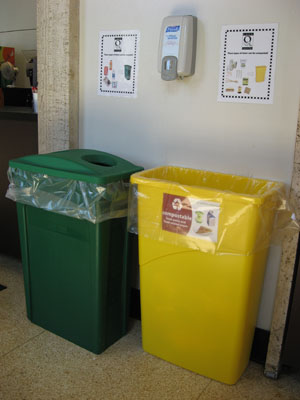Over the years, the library has supported a number of sustainable initiatives. We’re  pleased to be able to add composting to the list. Thanks to the efforts of our own Café Q, a bright yellow bin is now located to the right of the counter, next to the green recycling bin.
pleased to be able to add composting to the list. Thanks to the efforts of our own Café Q, a bright yellow bin is now located to the right of the counter, next to the green recycling bin.
But this isn’t your typical backyard compost pile. The bin contents are processed by Waste Neutral Group in Baltimore County. On the commercial scale, most things can be composted—everything from food scraps, including meat and bones, to napkins, tea bags and wooden coffee stirrers. Even the plastic cups, which are now plant rather than petroleum based, can go in the yellow bins!
So what goes in the green recycling bin? Treat it like the comingled receptacle in your home. Paper, bottles, and plastic packaging like yogurt cups and disposable food containers. Very little of what you use is actual trash, just styrofoam, plastic wrap, sandwich bags and snack food wrappers from chips or candy bars. Don’t worry—we’ve added signage to help you sort.
But why compost? In the United States, food waste is the second largest waste stream after paper. When landfilled it contributes to the release of methane, a greenhouse gas 21 times more potent than carbon dioxide. Like recycling, composting takes a previously discarded “waste” product and capitalizes on the inherent value of the material to produce a new product—nutrient-rich fertilizer. Our own finished compost comes back to campus for us to use in potted plants and landscaping.
With President Daniels’ recent pledge to reduce greenhouse emissions 51% by 2025, this is just another step we can take to reduce the university’s carbon footprint. We’ve already added bins to our staff lounge and behind the Cafe Q counter. Other successful composting programs on Homewood include Gilman Hall, Fresh Food Cafe in AMR 3 and Nolan’s Cafe in the Charles Common.
Interested in greening your next campus event? The Office of Recycling would be happy to deliver compost and comingled bins. To learn more about green initiatives throughout the Hopkins community, visit the Sustainability Office’s website.

One thought on “Composting at Café Q”